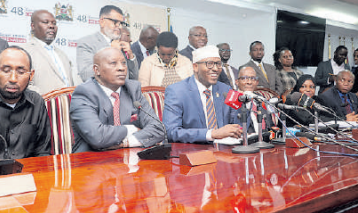
Governors are threatening to boycott future negotiations on the Division of Revenue Bill for lack of genuine involvement.
Through the Council of Governors, they said their participation in the negotiations is only to “tick the box”.
“It
will be pointless to attend such negotiations if the allocation for the
2025-26 financial year is anything to go by,” CoG chair and Wajir
Governor Ahmed Abdullahi said.
He said the council had proposed Sh536 billion as the equitable revenue share for counties.
However,
according to the budget estimates presented by National Treasury CS
John Mbadi, counties have been allocated only Sh405 billion.
Abdullahi
said at least 200 functions worth about Sh150 billion were transferred
to county governments, but they are not adequately factored into the
revenue-sharing formula.
“It
loses all meaning if the national government unilaterally decides
county allocations. Our input must be meaningful, not ceremonial,” he
said.
The
council dismissed the ongoing mediation process between the National
Assembly and the Senate over the Division of Revenue Bill, 2025, as
“mere tokenism”.
Over
the past five years, the equitable share has steadily risen, from
Sh316.5 billion in 2020-21 to Sh370 billion in both 2021-22 and
2022-23.
However, governors argue that the increases fall far short of what is needed to fully support devolved functions.
The
equitable share is a critical lifeline for county governments,
distributed using a formula that factors in population size, health
services, agriculture, road infrastructure and poverty levels.
Abdullahi
voiced frustration with the outcome of the Intergovernmental Budget and
Economic Council, a forum bringing together national and county
governments, the CRA and the National Treasury.
“At
the IBEC meeting, we deliberated and revised the figure capped at Sh536
billion, but the National Treasury’s earlier proposal of Sh405 billion
has been retained. It’s disappointing,” he said.
The CoG chair also criticised the Senate for what they termed “lukewarm support” for counties.
“The
Senate has not stamped its authority in the negotiations. We appear
before the Finance and Budget Committee, but when things go wrong, they
shift the blame to governors, yet we don’t have a seat at the table
during mediation,” Abdullahi said.
He
urged senators to take a firm stand during the mediation process and
insist on the Sh536 billion proposal advanced by the CoG.
“Senators must reject any increment that falls below what was costed during the unbundling of devolved functions,” he said.
“Settling for less than Sh150 billion worth of transferred responsibilities is unacceptable.”
The Division of Revenue Bill is a key piece of legislation that, upon enactment, provides for the equitable division of revenue raised nationally between the national and county governments in every financial year.















